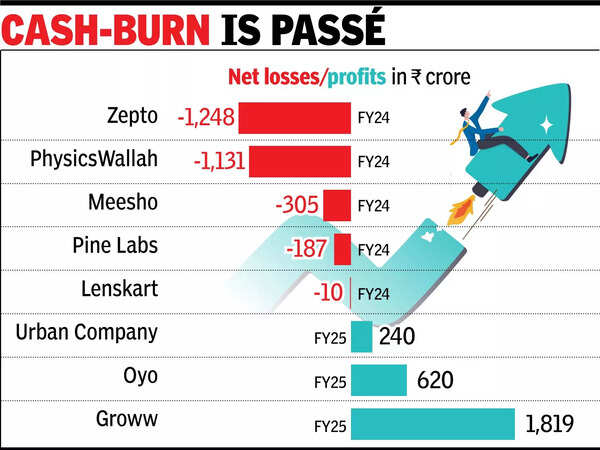Startups chase profits, their ticket to Dalal Street

MUMBAI: Startups gearing up to go public are setting their financials in order – cutting losses and chasing profitability. IPO-bound Urban Company reported its first full year of profitability in FY25, the firm said in its annual report last week. Although much of the profits – Rs 240 crore on a consolidated basis – came on the back of a Rs 211-crore deferred tax credit, the startup managed to turn in profits even on a pre-tax basis. Hit by the tech downturn post pandemic that saw valuations of loss-making startups getting eroded in private market and investor narrative shifting from growth at any cost to profits – companies had already begun fixing their financials; those eyeing an IPO had been more focused given the affinity of public markets for profitable firms and the added scrutiny they bring forth. The trend is not new but in the current times, companies may have to do more than just paring losses. In a volatile market situation, the bar for IPOs is much higher and it is imperative for companies to be profitable, analysts said.

“The revenue metrics are no longer benchmarks from a (IPO) valuation perspective. For even the anchor book to come in, profitability is important. Ebitda level profitability is also fine but investors will not favour companies that burn cash,” Mehekka Oberoi, fund manager at IIFL Fintech Fund told TOI. Given that there are some listed startups today, the benchmarks for companies now going IPO are higher and profitability has become more important, said Gopal Jain, managing partner at Gaja Capital. “There is less space for vanity metrics in public markets. Because they cater to all kind of investors, they focus on simple metrics like profitability.” “Also, public markets show leniency when new sectors are born, as the sectors become deeper, the bar for subsequent companies go up,” Jain said. Urban Company now joins the league of players like Groww which are profitable; Oyo which is making its third attempt in going public is also in the black. Meesho and Lenskart heavily cut down on their losses in FY24, their latest filings show; analysts do not rule out more companies reporting profitability for FY25. Meesho’s consolidated losses narrowed to Rs 304 crore in FY24 from Rs 1,675 crore in FY23. The company had earlier this year said that excluding Esop costs, its losses stood at Rs 53 crore in FY24 and it managed to turn profitable in Q2FY24. Lenskart’s consolidated losses narrowed to Rs 10 crore in FY24 from Rs 64 crore in FY23. Shiprocket had said that it expects to record profits in FY25. Yet, there is much work ahead – companies such as Physicswallah saw their losses balloon in FY24.“As IPO-bound companies gear up for public spotlight, key lessons from recent listings are clear: markets value consistency, discipline, and predictability over aggressive short-term growth,” said Nishit Garg, partner, Asia investment team at RTP Global.








